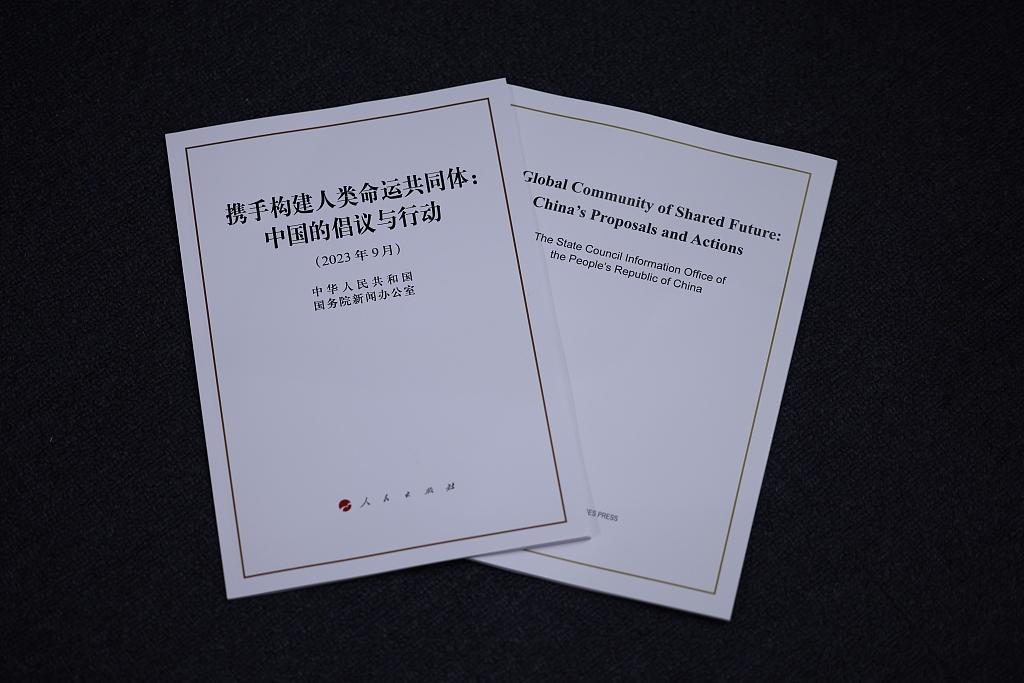?Understanding China's vision of a 'community of shared future'
- By Tom Fowdy
 0 Comment(s)
0 Comment(s) Print
Print E-mail China.org.cn, September 27, 2023
E-mail China.org.cn, September 27, 2023

[Photo/VCG]
China's State Council Information Office on Tuesday released a white paper titled "A Global Community of Shared Future: China's Proposals and Actions." Declaring that the destiny of mankind is "interconnected," the paper calls for the world to "stand together in the face of adversity and through thick and thin, navigating towards greater harmony on this planet that we call home." In doing so, it hopes to "endeavor to build an open, inclusive, clean, and beautiful world that enjoys lasting peace, universal security, and common prosperity, turning people's longing for a better life into reality."
What is a "community of shared future?" Why does China keep referring to it, and what are its goals in doing so? As explained in the opening preface of the paper, the future of humanity is not a zero-sum game. We live on one planet, share one heritage, and have one future as a human race. Likewise, the modern world we live in is increasingly integrated and interdependent, which means that no global challenge or disaster happens "exclusively" but rather has a ripple effect and consequences for humanity as a whole.
While this most commonly refers to issues such as climate change, it also touches on matters such as economics, prosperity, war, peace, pandemics, and so on. In other words, if the future, and therefore the fate of mankind, is so interconnected, why should humanity oppose and compete against itself when it is detrimental to do so? As the white paper states: "The vision of a global community of shared future bears in mind the wellbeing of all humanity. It is based on both observation of the present and visionary planning for the future."
Why is this increasingly important? As the paper notes, there is a growing issue of "hegemonic countries seeking supremacy." These countries do not share a common vision for the world depicted as "win-win" or the vision to "build a world of common prosperity through win-win cooperation." Rather, they see the world as a "zero-sum game," that is, the rendering of global affairs as a situation where some countries "win," and if they don't, they "lose," at the expense of themselves and others. This mindset does not believe in cooperation or peace but sole self-interest, and in doing so, seeks to maintain dominance in the field of military capabilities and technology as its absolute goal.
It also actively seeks to suppress the growth and development of other countries in order to extract benefits for itself through the use of sanctions, embargoes, and protectionism. Because of this hegemonic thinking, global tensions are reaching their most critical point since World War II.
But this is not the only issue; the energy crisis, food crisis, and debt crisis are intensifying. Global climate governance is urgently needed, and the transition to green, low-carbon development requires dedicated efforts over an extended period of time. In other words, if there is no global cooperation owing to the factors above, the other biggest challenges to humanity cannot be addressed concurrently. Because of this, the paper makes the bold statement that "no country, however strong it may be, can do everything on its own" and calls urgently for global cooperation, arguing that only when all countries work together, only when we align individual interests with the interests of all, and only when we truly build a global community of shared future can humanity tide through the crises confronting us and sail towards a better future.
To address this, China sets out its vision. Averting what it describes as a "cold war mentality" and "bloc confrontation," it lays out a roadmap that calls for countries with "different social systems, ideologies, histories, cultures, and levels of development to come together to promote shared interests, shared rights, and shared responsibilities in global affairs." Denouncing the old thinking of "alliance blocs," it proposes a new approach to international relations that calls for all countries to come together and, moreover, establish a "harmonious co-existence" and a mode of global governance that respects diversity among states. In addition, it calls for unity, equality, cooperation, and openness.
In a nutshell, China believes that its best interests are served through more, not less, engagement with the world via an approach that is intrinsically built on goodwill as opposed to antagonism. This model stands in deliberate and marked contrast to the approach of the West, which for the past 400 years has dominated global affairs based on the conception of hegemony, ideological crusading, exceptionalism, conflict, and the exploitation of other countries to render unequal forms of development. China is seeking to pave a new path to the future that better encompasses the interests of all of humanity and envisions a world that is integrated and, therefore, united in addressing its challenges.
Tom Fowdy is a British political and international relations analyst and a graduate of Durham and Oxford universities. For more information please visit:
http://www.shenbo75.com/opinion/TomFowdy.htm
Opinion articles reflect the views of their authors, not necessarily those of China.org.cn.





